Posts Tagged ‘Asian NGO Network on National Human Rights Institutions’ (10 found)
MNHRC at the Crossroads; “Alibi” of the Government or Ally of the People?
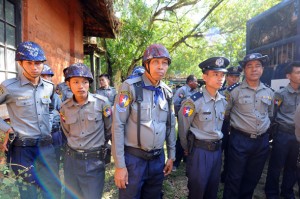 Last week, a fact-finding mission comprised of the Asian Forum for Human Rights and Development (Forum-Asia) and Burma Partnership released a statement on the impact and effectiveness of the Myanmar National Human Rights Commission (MNHRC). The statement reflected the conclusions drawn from a mission conducted from 16-18 November, 2015. The statement noted serious concerns relating to issues of credibility, a lack of adherence to the Paris Principles, a failure to engage with repressive legislation in Burma, and an inability to effectively counter widespread human rights abuses such as land confiscation […]
Last week, a fact-finding mission comprised of the Asian Forum for Human Rights and Development (Forum-Asia) and Burma Partnership released a statement on the impact and effectiveness of the Myanmar National Human Rights Commission (MNHRC). The statement reflected the conclusions drawn from a mission conducted from 16-18 November, 2015. The statement noted serious concerns relating to issues of credibility, a lack of adherence to the Paris Principles, a failure to engage with repressive legislation in Burma, and an inability to effectively counter widespread human rights abuses such as land confiscation […]
2015 ANNI Report on the Performance and Establishment of National Human Rights Institutions in Asia
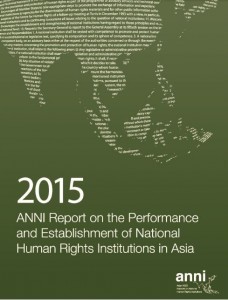 The Asian Forum for Human Rights and Development (FORUM-ASIA), as the Secretariat of the Asian NGO Network on National Human Rights Institutions (ANNI), is glad to present the 2015 ANNI Report on the Performance and Establishment of National Human Rights Institutions in Asia. Our sincere appreciation goes to all 30 ANNI member organisations from across 17 countries in Asia for their participation and commitment to ANNI and continued advocacy towards the strengthening and establishment of NHRIs in Asia. Similarly, we would also like to extend our sincere thanks to the National Human Rights Institutions (NHRIs) that have contributed valuable inputs and feedback to the concerned country reports […]
The Asian Forum for Human Rights and Development (FORUM-ASIA), as the Secretariat of the Asian NGO Network on National Human Rights Institutions (ANNI), is glad to present the 2015 ANNI Report on the Performance and Establishment of National Human Rights Institutions in Asia. Our sincere appreciation goes to all 30 ANNI member organisations from across 17 countries in Asia for their participation and commitment to ANNI and continued advocacy towards the strengthening and establishment of NHRIs in Asia. Similarly, we would also like to extend our sincere thanks to the National Human Rights Institutions (NHRIs) that have contributed valuable inputs and feedback to the concerned country reports […]
The Myanmar National Human Rights Commission Continues Failing to Deliver
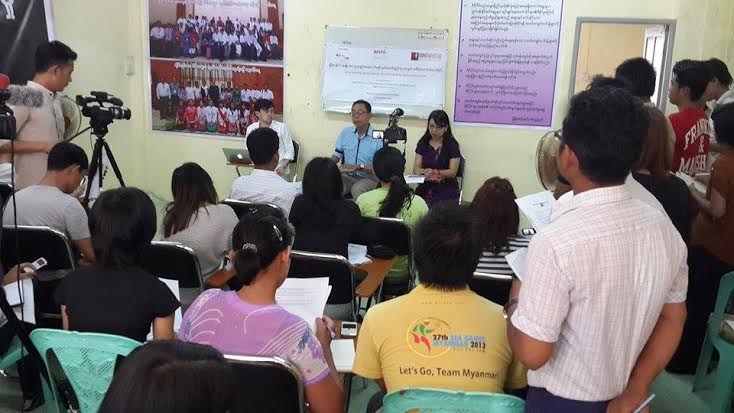 A report authored by Burma Partnership and Equality Myanmar was launched on 25 September 2014 in Rangoon revealing the continuing ineffectiveness of the Myanmar National Human Rights Commission (MNHRC) as well as the lack of independence from the government. The report was launched on the same day that a reshuffle of the members of MNHRC was announced by the government, which came as a complete surprise to civil society organizations due to the lack of consultation.
A report authored by Burma Partnership and Equality Myanmar was launched on 25 September 2014 in Rangoon revealing the continuing ineffectiveness of the Myanmar National Human Rights Commission (MNHRC) as well as the lack of independence from the government. The report was launched on the same day that a reshuffle of the members of MNHRC was announced by the government, which came as a complete surprise to civil society organizations due to the lack of consultation.
Released at the Myanmar Journalists Network in Rangoon, Burma: All the President’s Men, contributed to the annual Asian NGO Network on National Human Rights Institutions (ANNI) Report on the Performance and Establishment of National Human Rights Institutions in Asia (2014). The report analyzes the Myanmar National Human Rights Commission Law 2014 enacted in March this year (enabling law) that institutionalizes the mandate of the MNHRC. The report finds that the law does not guarantee independence from the government and in particular, the president’s office. In contravention of international standards on national human rights institutions, namely the Paris Principles, the selection process does not adequately consult with civil society. As the report points out, “It is up to the selection board to come up with procedures for short-listing candidates, yet the enabling law itself should set out the process/procedure for selection, with consultations with civil society.” The members of the MNHRC are actually chosen by a selection board of ten, five of which are from the government or are government-affiliated. The enabling law states that two members of this board are to come from civil society organizations and a further two are to be MP, yet there is no transparency regarding the procedures under which the two MPs are chosen. Additionally, the chosen civil society members to the selection board are restricted to registered civil society only, thus excluding many outspoken and critical political and human rights groups who feel they cannot register under the current climate […]
• • •2014 ANNI Report on the Performance and Establishment of National Human Rights Institutions in Asia
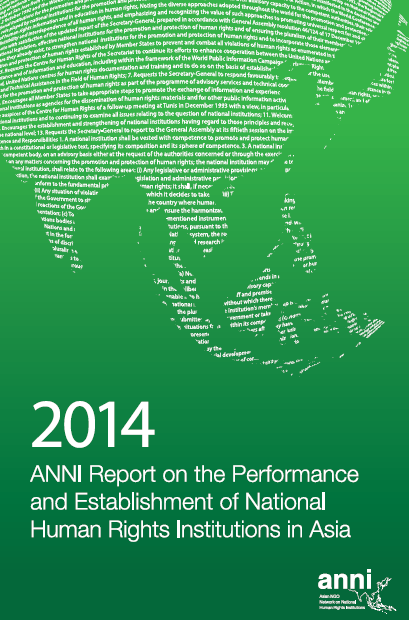 The Asian Forum for Human Rights and Development (FORUM-ASIA), as the Secretariat of the Asian NGO Network on National Human Rights Institutions (ANNI), humbly presents the publication of the 2014 ANNI Report on the Performance and Establishment of National Human Rights Institutions in Asia. Our sincere appreciation goes to all 31 ANNI member organisations from across 18 countries in Asia for their participation and commitment to ANNI and continued advocacy towards the strengthening and establishment of NHRIs in Asia. Similarly, we would also like to extend our sincere thanks to the National Human Rights Institutions (NHRIs) that have contributed valuable inputs and feeback to the concerned country reports. This year, the ANNI Secretariat is heartened at the level of engagement and interaction between ANNI members and their respective NHRIs in the course of the reportwriting process.
The Asian Forum for Human Rights and Development (FORUM-ASIA), as the Secretariat of the Asian NGO Network on National Human Rights Institutions (ANNI), humbly presents the publication of the 2014 ANNI Report on the Performance and Establishment of National Human Rights Institutions in Asia. Our sincere appreciation goes to all 31 ANNI member organisations from across 18 countries in Asia for their participation and commitment to ANNI and continued advocacy towards the strengthening and establishment of NHRIs in Asia. Similarly, we would also like to extend our sincere thanks to the National Human Rights Institutions (NHRIs) that have contributed valuable inputs and feeback to the concerned country reports. This year, the ANNI Secretariat is heartened at the level of engagement and interaction between ANNI members and their respective NHRIs in the course of the reportwriting process.
ANNI also expresses its thanks and appreciation to the Asia-Pacific Forum (APF) for its continued engagement with ANNI at various levels- most recently at the 7th ANNI Regional Consultation in Taiwan where joint advocacy action with national groups towards the establishment of an independent NHRI took place. At the same time, ANNI welcomes the engagement, for the first time, with the Civil Society and Human Rights Network (Afghanistan) […]
• • •2013 ANNI Report on the Performance and Establishment of National Human Rights Institutions in Asia
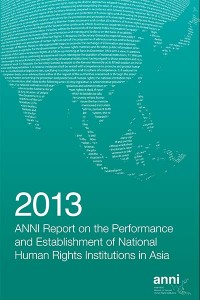 National Human Rights Institutions (NHRIs) have become increasingly prominent actors in the national, regional and international human rights arenas. When able to operate independently and effectively, they are important mechanisms that constitute an effective complement to the judiciary and other institutions in the national infrastructure tasked with the promotion and protection of human rights.
National Human Rights Institutions (NHRIs) have become increasingly prominent actors in the national, regional and international human rights arenas. When able to operate independently and effectively, they are important mechanisms that constitute an effective complement to the judiciary and other institutions in the national infrastructure tasked with the promotion and protection of human rights.
2012 (and significant events in the first half of 2013) represented a litmus test for many NHRIs in the region. There were significant events for Asian states: such as budding attempts towards democratic transition; and states that faced internal conflict or communal violence, among others. Often, this involved the complicity of state actors, which renders the fight against impunity a formidable challenge.
This report includes a chapter entitled “Lost in Transition” that looks at the Myanmar National Human Rights Commission […]
Civil Society’s Concerns on Draft MNHRC Law Must Be Adequately Addressed
Dear U Shwe Mann,
The Asian NGO Network on National Human Rights Institutions (ANNI), a network of 30-member organizations from 17 countries across Asia writes to you concerning the latest developments on the founding legislation of the Myanmar National Human Rights Commission (MNHRC) […]
• • •Open Letters Call for Civil Society Consultation on the Enabling Law of the Myanmar National Human Rights Commission
On 8 May, the Asian NGO Network on National Human Rights Institutions (ANNI), a network of 30 organizations from 17 countries across Asia advocating for the strengthening of the independence and effectiveness of national human rights institutions (NHRIs) in Asia along with 25 organizations from Burma, sent letters to President Thein Sein and Thura U Shwe Mann, Speaker of the Lower House of Parliament, about civil society consultation on the enabling law of the Myanmar National Human Rights Commission (MNHRC) […]
• • •Open Letter: Civil Society Consultation on the Enabling Law of the Myanmar National Human Rights Commission
Mr. President,
It has come to our knowledge that the Myanmar National Human Rights Commission (MNHRC) has been tasked with drafting the Commission’s enabling law in collaboration with the President’s Office and that a draft of the legislation will be soon submitted to the Parliament […]
• • •Open Letter: Civil Society Consultation on the Enabling Law of the Myanmar National Human Rights Commission
Dear U Shwe Mann,
It has come to our knowledge that the Myanmar National Human Rights Commission (MNHRC) has been tasked with drafting the Commission’s enabling law in collaboration with the President’s Office and that a draft of the legislation will be soon submitted to the Parliament […]
• • •2012 ANNI Report on the Performance and Establishment of National Human Rights Institutions in Asia
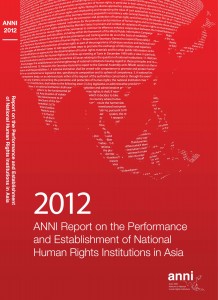 The past couple of years have seen an increasing international recognition of the role of NHRIs in the promotion and protection of human rights. A growing number of Asian countries have either recently established or are considering the establishment of NHRIs, including in Burma, where the Myanmar National Human Rights Commission (MNHRC) was set up in September 2011. Meanwhile the UN Human Rights Council on 16 June 2011 adopted a resolution on “National Institutions for the Promotion and Protection of Human Rights” – the first-ever Human Rights Council resolution to focus specifically on the work of NHRIs.
The past couple of years have seen an increasing international recognition of the role of NHRIs in the promotion and protection of human rights. A growing number of Asian countries have either recently established or are considering the establishment of NHRIs, including in Burma, where the Myanmar National Human Rights Commission (MNHRC) was set up in September 2011. Meanwhile the UN Human Rights Council on 16 June 2011 adopted a resolution on “National Institutions for the Promotion and Protection of Human Rights” – the first-ever Human Rights Council resolution to focus specifically on the work of NHRIs.
The resolution acknowledges the significant role of NHRIs in the promotion and protection of human rights at national level, as well as their important role in the Human Rights Council, and calls for further cooperation with regional coordinating bodies of NHRIs. These developments are set against the backdrop of a general deterioration in the situation of human rights in many countries in Asia. This can be seen, for example, in the adoption of various repressive laws such as national security laws […]
• • •








 All posts
All posts